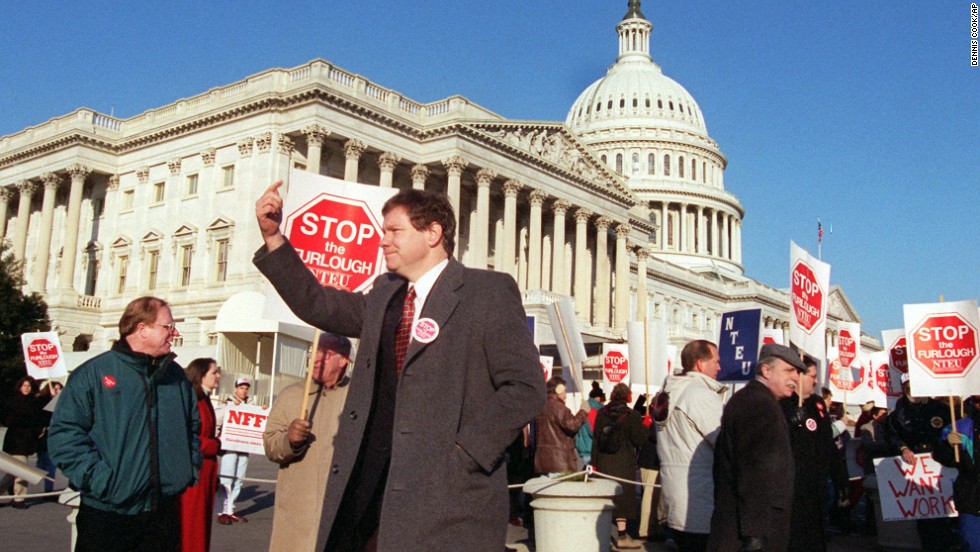The night of November 14, 1995 was supposed to be a victory for the Republican-controlled Congress. After passing a budget that would fund the government and decrease government spending, the Republicans felt confident that they averted a shutdown. However, that was not the case. By the time the budget made its way to the desk of Democratic president Bill Clinton, Clinton refused to sign the bill to fund the government. By refusing to sign the budget, parts of the government shut down. This led to protests by government employees, since they were not given their paychecks from the government.

Clinton wanted to increase funds for Medicare, Medicaid, education, and preserving the environment.1 The Republicans, though, wanted the opposite. By refusing to increase funding for Medicare, Medicaid, and preserving the environment, Clinton vetoed the budget and held negotiations to reach a compromise. However, Clinton had an issue with one of the Republican leaders he was meeting with, House Speaker Newt Gingrich. Before the shutdown, Clinton and Gingrich attended the funeral of Yitzhak Rabin, the Prime Minister of Israel. During the flight, Gingrich was told to sit at the back of the plane. It was perceived by others that Gingrich tried to use the shutdown as a form of vengeance against President Clinton. Although Gingrich felt angry at Clinton for the event on the flight, it did not affect the ongoing negotiations. After holding talks with Congress for five days, Congress passed a continuing resolution, which kept the government funded until December. Clinton signed the resolution on November 19, 1995, ending the five-day shutdown. After the resolution was signed, Congress was in a race against time to prevent another shutdown. Gingrich, however, thought to use this time to bash the President. During this period, Speaker of the House Newt Gingrich voiced his disagreements with President Clinton on the budget. By doing this, Gingrich made a tactical mistake by appearing too eager to shut down the government again.2 On December 16, 1995, Congress wanted to pass a second continuing resolution to give themselves more time to put the budget together. Clinton soon vetoed the resolution, thus sending the government into another shutdown. Both Congress and President Clinton found themselves back at the drawing board again.

President Clinton and Congress met on December 29, 1995, to compromise on a budget. During this time, the country was getting ready for the presidential elections. Republicans sought to use this shutdown as a weapon against Clinton’s failed policies. The negotiations continued until January 1996. On January 5, 1996, protests had erupted outside the Capitol. Government workers were demanding the end of the government shutdown, so they could get paid. Republicans held a press conference about the negotiations. They argued that they were trying to reduce government spending on federal programs, whereas Clinton wanted to increase spending for those programs. In some sense, Republicans thought that the amount of federal spending was one of the bones they had to pick with Clinton.3 By January 6, 1996, a compromise was met and President Clinton agreed to sign the budget bill, thus ending the twenty-one-day shutdown.

Although the shutdown was over, there were some benefits for both political parties. The Democrats and the Republicans made some gains after the 1996 presidential election. Democrats gained a few seats in the House of Representatives. Republicans, on the other hand, gained two seats in the Senate and kept control of Congress. House Speaker Newt Gingrich, however, had his political reputation damaged because of the disagreements with President Clinton over the budget. President Clinton’s job approval ratings were generally above the 50% mark after the shutdown in 1996 and he cruised to a re-election victory over his Republican opponent, Senator Bob Dole, in the fall of that year.4
- David J. Maraniss, The First Term. In Presidents: A Reference History (Detroit: Charles Scribner’s Sons, 2002), 626. ↵
- Kessler Glenn, “The Fact Checker: Lessons from the government shutdown of 1995-96,” The Washington Post no.1 (February 2011): 1. ↵
- George F. Will, “Republicans as Red Sox: The 1995 government shutdown reduced the importance of GOP control of Congress,” Newsweek no. 1 (October 1998): 92. ↵
- Frank Newport, “More in U.S. Say Shutdown Is About Politics Than Principle,” Gallup Poll Briefing no. 1 (2013): 1. ↵



58 comments
Thalia Romo
This article goes into incredible detail about the government shutdown in 1995. Clinton’s refusal to sign the bill shows a sense of how he believed education, Medicaid, Medicare and preservation of the government is more important than just funding the government and decreasing spending. Although the shutdown lasted 21 days, nearly a month, some plus sides came from it. Past the disagreements and tension of the President and Congress, both political parties were able to gain something from this experience; A politically balanced congress.
Christopher Hohman
Nice article. It is interesting that many of the issues that were so important almost twenty five years ago are still important today. In the specter of the most recent government shutdown twenty-one days seems like nothing anymore. I have always thought it was unfair that government workers are often the ones that pay the heaviest price. After all they need their pay checks more than those on capital hill.
Engelbert Madrid
I was not familiar with the United States government shutdown 1995-96. Republicans and Democrats will always have disagreements since both have different ideas and concepts that are always argued. Similar to Ex-President Bill Clinton and Ex-House Speaker Newt Gingrich, both could never agree in many things because of their political views. Although the article didn’t went much into detail about the government shutdown, I found it interesting to read.
Eric Ortega Rodriguez
This article was fascinating, in high school, we would often talk about government shutdowns but never understood what they were or why they happened. This article is very intriguing in the sense that it explains that government shutdowns can occur for reasons outside the political realm. This article talks about Newt Gingrich and his possible reason for disagreeing was simply because he wanted to get vengeance on the president, which is absolutely absurd. Overall, this article was captivating and informative on the topic of government shutdowns.
Lamont Traylor
The government is thought to be terrible by many people and great by many others. In my opinion the government is very corrupt, and things need to change but then again, like many other people I don’t know much about the news and how the government works because honestly, I don’t care because I have 0 control over what happens in our government.
Noah Bolhuis
It is disappointing to see that then and now, government shutdowns is a political move that can gain a party support. It is sad that this nation’s politicians abuse this country and the money gained through the tax payers to get a political gain. However, it is apparent that today’s politics is still based or rooted on the same political disagreements, and it is sad to say that there realistically no end in sight on these disagreements.
Didier Cadena
This was a very interesting article. I was unfamiliar with this government shutdown, so it was great to read a little bit about it. I found it interesting that after the shutdown Clinton’s approval rating went up and he was reelected, I would have thought that this event would have hurt his chances. The article does a great job of keeping the reader engaged and still make it fun to read.
Thomas Fraire
Fascinating article and extremely elegantly composed. I generally think that it’s interesting to peruse about the administrations close down and after perusing this article, it simply demonstrated my point indeed. Perusing how contrasts could cause a legislature close down some time ago and constrain its maximum capacity, just demonstrates how there could, in any case, be one today. What makes it considerably all the more fascinating is to see that the contentions that Republicans and Democrats had in those days, are as yet happening today. In General, I observed this article to be exceptionally useful and very much organized.
Carlos Sandoval
I found this article to be very entertaining because at times I find myself thinking about what would happen if the government shut down. All through high school I never got the chance to learn about this but I wished I would have. This was a very well written and informative article, there was a lot of hardworking put into it.
Anais Del Rio
One of the pictures in the article helped make the article intriguing and even suggested that the government shutdown was caused by such a silly interaction. Though it was interesting to read the effects of the event such as people protesting and trying to negotiate a solution between the two political parties. Thankfully government shutdowns are a rare occurrence since it would affect government resources and the people more than one would expect.